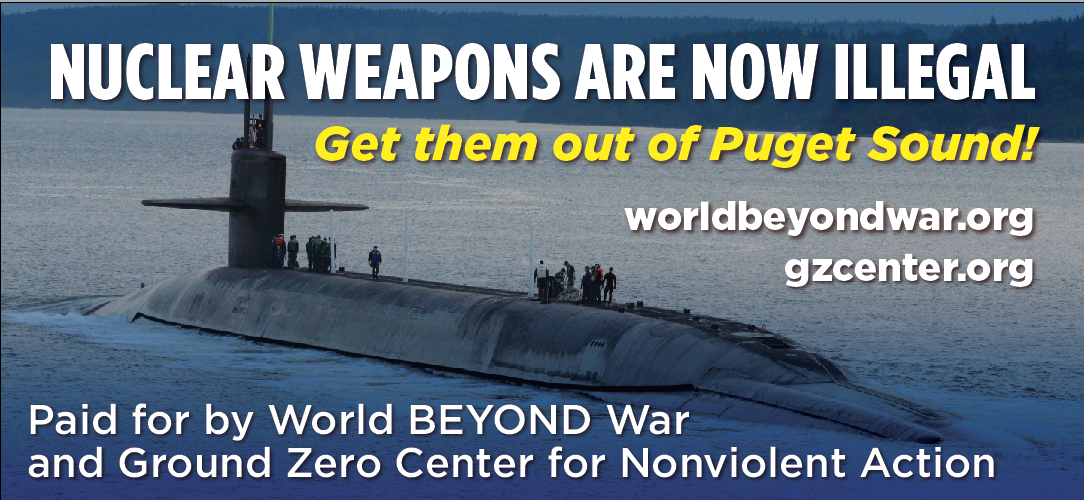
By David Swanson, Executive Director of World BEYOND War, and Elizabeth Murray, of Ground Zero Center for Nonviolent Action, published by Kitsap Sun, January 24, 2021
From January 18 to February 14, four large billboards are going up around Seattle that proclaim “Nuclear Weapons Are Now Illegal. Get them out of Puget Sound!”
What can this possibly mean? Nuclear weapons may be unpleasant, but what is illegal about them, and how can they be in Puget Sound?
Since 1970, under the Nuclear Nonproliferation Treaty, most nations have been forbidden to acquire nuclear weapons, and those already possessing them — or at least those party to the treaty, such as the United States — have been obliged to “pursue negotiations in good faith on effective measures relating to cessation of the nuclear arms race at an early date and to nuclear disarmament, and on a treaty on general and complete disarmament under strict and effective international control.”
Needless to say, the U.S. and other nuclear-armed governments have spent 50 years not doing this, and in recent years the U.S. government has torn up treaties limiting nuclear weapons, and invested heavily in building more of them.
Under the same treaty, for 50 years, the U.S. government has been obliged “not to transfer to any recipient whatsoever nuclear weapons or other nuclear explosive devices or control over such weapons or explosive devices directly, or indirectly.” Yet, the U.S. military keeps nuclear weapons in Belgium, the Netherlands, Germany, Italy, and Turkey. We can dispute whether that state of affairs violates the treaty, but not whether it outrages millions of people.
Three years ago, 122 nations voted to create a new treaty to ban the very possession or sale of nuclear weapons, and the International Campaign to Abolish Nuclear Weapons won the Nobel Peace Prize. On January 22, 2021, this new treaty becomes law in over 50 nations that have formally ratified it, a number that is rising steadily and is widely expected to reach a majority of the world’s nations in the near future.
What difference does it make for nations with no nuclear weapons to ban them? What does it have to do with the United States? Well, most nations banned landmines and cluster bombs. The United States did not. But the weapons were stigmatized. Global investors took their funding away. U.S. companies stopped making them, and the U.S. military reduced and may have finally ceased its use of them. Divestment from nuclear weapons by major financial institutions has taken off in recent years, and can safely be expected to accelerate.
Change, including on such practices as slavery and child labor, has always been far more global than one might infer from the typical U.S. history text. Globally, nuclear weapons possession is becoming thought of as the behavior of a rogue state. One of those rogue states keeps some of its stigmatized weaponry in Puget Sound.
The Naval Base Kitsap-Bangor hosts eight Trident submarines and arguably the largest concentration of deployed nuclear weapons in the world. Former Seattle Archbishop Raymond Hunthausen famously characterized Kitsap-Bangor as “the Auschwitz of Puget Sound.” New nuclear-armed submarines are now planned for deployment to Kitsap-Bangor. The relatively tiny nuclear weapons on these submarines, horrifyingly characterized by U.S. military planners as “more usable” are two to three times as powerful as what was dropped on Hiroshima.
Do the people of the Seattle area support this? Certainly we have never been consulted. Keeping nuclear weapons in Puget Sound is not democratic. It’s also not sustainable. It takes funding badly needed for people and our environment and puts it into environmentally destructive weaponry that increases the risk of nuclear holocaust. Scientists’ Doomsday Clock is closer to midnight than ever before. If you want to help dial it back, or even eliminate it, you can get involved with the Ground Zero Center for Nonviolent Action and with World BEYOND War.
##









One Response
Bravo. Mwen pa fasil wè atik ankreyòl sou sijè sa a. Mwen vrèman kontan li yon atik nan lang kreyòl Ayisyen an sou kesyon zam nikleyè. Depi kòmansman ane 2024 la m chwazi pibliye kèk atik an kreyòl Ayisyen sou zam nikleyè oubyen dezameman nikleyè jis pou m ka sansibilize Ayisyen k ap viv Ayiti ak nan dyaspora a. Fèm konnen pou m ka pataje kèk atik avèk nou. Bon travay. Mèsi Roland